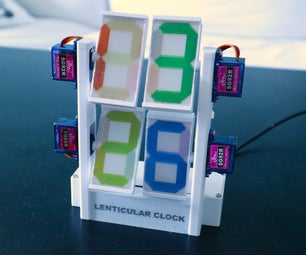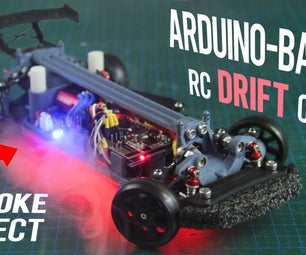Introduction: Arduino Excuse Generator
Need an excuse in a hurry?
Look no further than the Excuse Generator.
Look no further than the Excuse Generator.
Step 1: What You Need / Wire It Up
We are using:
Arduino Uno
LCD Module (HD44780 compatible)
Potentiometer
Tilt Switch
220 Ohm Resistor (Red-Red-Black-Black) / (Red-Red-Brown) or 470 Ohm or 560 Ohm is fine too
Wire up the LCD module to the Arduino as listed below and illustrated in the Diagrams.
Don't forget to wire in the Pot and the Tilt Switch too as shown.
Wire up the LCD Module as follows:
LCD pin (1) / Vss -> Gnd
LCD pin (2) / Vdd -> 5V
LCD pin (4) / RS -> 12
LCD pin (5) / R/W -> Gnd
LCD pin (6) / E -> 11
LCD pin (11) / D4 -> 5
LCD pin (12) / D5 -> 4
LCD pin (13) / D6 -> 3
LCD pin (14) / D7 -> 2
In addition you need to wire 5V/Gnd to the A/K of the backlight LED (pins 15/16); and wire in a potentiometer to adjust the contrast (pin 3).
Without the contrast adjustment and the backlight the LCD will not Display anything visible.
Arduino Uno
LCD Module (HD44780 compatible)
Potentiometer
Tilt Switch
220 Ohm Resistor (Red-Red-Black-Black) / (Red-Red-Brown) or 470 Ohm or 560 Ohm is fine too
Wire up the LCD module to the Arduino as listed below and illustrated in the Diagrams.
Don't forget to wire in the Pot and the Tilt Switch too as shown.
Wire up the LCD Module as follows:
LCD pin (1) / Vss -> Gnd
LCD pin (2) / Vdd -> 5V
LCD pin (4) / RS -> 12
LCD pin (5) / R/W -> Gnd
LCD pin (6) / E -> 11
LCD pin (11) / D4 -> 5
LCD pin (12) / D5 -> 4
LCD pin (13) / D6 -> 3
LCD pin (14) / D7 -> 2
In addition you need to wire 5V/Gnd to the A/K of the backlight LED (pins 15/16); and wire in a potentiometer to adjust the contrast (pin 3).
Without the contrast adjustment and the backlight the LCD will not Display anything visible.
Step 2: Here's the Code
(Apparently Instructables now Require All Steps to have a picture. So please enjoy this picture of the code on my screen :-) )
Please double check the =5V/Gnd Wiring. You can PERMANENTLY DAMAGE your board if this is wrong.
Once wired up, try the Hello World! Example to check everything is OK. You may need to adjust the potentiometer to see the Hello World! message.
(File -> Examples -> LiquidCrystal -> HelloWorld)
OK, so let’s proceed.
We’ve attached a tilt sensor to Arduino pin d10 so whenever you tap the sensor it activates an Excuse to be generated.
Here’s the code:
/*
Excuse Generator
by Anthony Kelly
Adapted from Arduino Starter Kit example
Project 11 - Crystal Ball
Parts required:
Arduino UNO
SainSmart LCD (HD44780 compatible)
Tilt Sensor
http://arduino.cc/starterKit
This example code is part of the public domain
*/
// include the library code:
#include <LiquidCrystal.h>
#include <string.h>
// initialize the library with the numbers of the interface pins
LiquidCrystal lcd(12, 11, 5, 4, 3, 2);
// set up a constant for the tilt switchPin
const int switchPin = 10;
// variable to hold the value of the switchPin
int switchState = 0;
// variable to hold previous value of the switchpin
int prevSwitchState = 0;
// a variable to choose which reply from the crystal ball
int reply;
int i;
// Define your excuses
char *start []= {"I'm sorry but ","Don't blame me ", "Not my fault ","Guess what happened "};
char *middle []= {"Godzilla ","Chuck Norris ", "Scrooge McDuck ","Soap McTavish"};
char *ends []= {"tried to kill me. ","ate my homework.","came after me.","stole my head."};
int length = 4;
void setup() {
// set up the number of columns and rows on the LCD
lcd.begin(16, 2);
// Set the pullup on the switch pin
pinMode(switchPin, INPUT);
digitalWrite(switchPin, HIGH);
}
void loop() {
// clean up the screen before printing a new reply
lcd.clear();
// Print a message to the LCD.
lcd.print("Need an");
// set the cursor to column 0, line 1
// line 1 is the second row, since counting begins with 0
lcd.setCursor(0, 1);
// print to the second line
lcd.print("Excuse?");
for (i=0; i<4; i++) {
// loop until the switch has changed from LOW to HIGH
while (!(switchState == HIGH && prevSwitchState == LOW)) {
// the switch did not change from LOW to HIGH last time
// Remember the previous switch state from the last iteration
prevSwitchState = switchState;
// Read the present state
switchState = digitalRead(switchPin);
// delay as a simple debounce
delay(100);
}
// the while loop exited wthout updating
// the previous switch state so do it now
prevSwitchState = switchState;
if (switchState == HIGH) {
// randomly choose a reply index
reply = random(length);
// clean up the screen before printing a new reply
lcd.clear();
// set the cursor to column 0, line 0
lcd.setCursor(0, 0);
// print some text
// A different part of the excuse for each for-loop iteration
switch(i) {
case 0:lcd.print(start[reply]); break;
case 1:lcd.print(middle[reply]); break;
case 2:lcd.print(ends[reply]); break;
}
}
}
}
Please double check the =5V/Gnd Wiring. You can PERMANENTLY DAMAGE your board if this is wrong.
Once wired up, try the Hello World! Example to check everything is OK. You may need to adjust the potentiometer to see the Hello World! message.
(File -> Examples -> LiquidCrystal -> HelloWorld)
OK, so let’s proceed.
We’ve attached a tilt sensor to Arduino pin d10 so whenever you tap the sensor it activates an Excuse to be generated.
Here’s the code:
/*
Excuse Generator
by Anthony Kelly
Adapted from Arduino Starter Kit example
Project 11 - Crystal Ball
Parts required:
Arduino UNO
SainSmart LCD (HD44780 compatible)
Tilt Sensor
http://arduino.cc/starterKit
This example code is part of the public domain
*/
// include the library code:
#include <LiquidCrystal.h>
#include <string.h>
// initialize the library with the numbers of the interface pins
LiquidCrystal lcd(12, 11, 5, 4, 3, 2);
// set up a constant for the tilt switchPin
const int switchPin = 10;
// variable to hold the value of the switchPin
int switchState = 0;
// variable to hold previous value of the switchpin
int prevSwitchState = 0;
// a variable to choose which reply from the crystal ball
int reply;
int i;
// Define your excuses
char *start []= {"I'm sorry but ","Don't blame me ", "Not my fault ","Guess what happened "};
char *middle []= {"Godzilla ","Chuck Norris ", "Scrooge McDuck ","Soap McTavish"};
char *ends []= {"tried to kill me. ","ate my homework.","came after me.","stole my head."};
int length = 4;
void setup() {
// set up the number of columns and rows on the LCD
lcd.begin(16, 2);
// Set the pullup on the switch pin
pinMode(switchPin, INPUT);
digitalWrite(switchPin, HIGH);
}
void loop() {
// clean up the screen before printing a new reply
lcd.clear();
// Print a message to the LCD.
lcd.print("Need an");
// set the cursor to column 0, line 1
// line 1 is the second row, since counting begins with 0
lcd.setCursor(0, 1);
// print to the second line
lcd.print("Excuse?");
for (i=0; i<4; i++) {
// loop until the switch has changed from LOW to HIGH
while (!(switchState == HIGH && prevSwitchState == LOW)) {
// the switch did not change from LOW to HIGH last time
// Remember the previous switch state from the last iteration
prevSwitchState = switchState;
// Read the present state
switchState = digitalRead(switchPin);
// delay as a simple debounce
delay(100);
}
// the while loop exited wthout updating
// the previous switch state so do it now
prevSwitchState = switchState;
if (switchState == HIGH) {
// randomly choose a reply index
reply = random(length);
// clean up the screen before printing a new reply
lcd.clear();
// set the cursor to column 0, line 0
lcd.setCursor(0, 0);
// print some text
// A different part of the excuse for each for-loop iteration
switch(i) {
case 0:lcd.print(start[reply]); break;
case 1:lcd.print(middle[reply]); break;
case 2:lcd.print(ends[reply]); break;
}
}
}
}
Step 3: Enjoy
Every time you tap the tilt Sensor a part of an Excuse will be generated.
Don't blame me
Chuck Norris
stole my head
Running out of excuses?
Change these lines to add more:
// Define your excuses
char *start []= {"I'm sorry but ","Don't blame me ", "Not my fault ","Guess what happened "};
char *middle []= {"Godzilla ","Chuck Norris ", "Scrooge McDuck ","Soap McTavish"};
char *ends []= {"tried to kill me. ","ate my homework.","came after me.","stole my head."};
int length = 4;
Don't blame me
Chuck Norris
stole my head
Running out of excuses?
Change these lines to add more:
// Define your excuses
char *start []= {"I'm sorry but ","Don't blame me ", "Not my fault ","Guess what happened "};
char *middle []= {"Godzilla ","Chuck Norris ", "Scrooge McDuck ","Soap McTavish"};
char *ends []= {"tried to kill me. ","ate my homework.","came after me.","stole my head."};
int length = 4;











